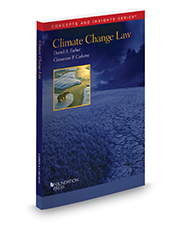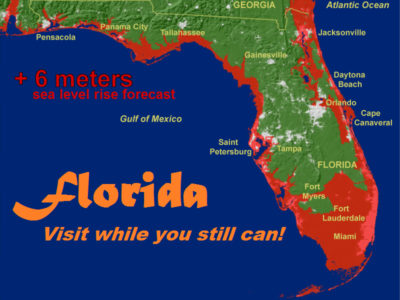It’s Official: Climate Change is Real and It’s Serious
The Administration allowed a key scientific report to come out. They'll have trouble explaining it away.
The release of the Fourth National Climate Assessment got some attention from the press. The press mostly focused on the forthright endorsement of climate science by the NCA4 report -- something of a surprise in the anti-science Trump Administration. That was indeed notable, but there are other features of the report that will make it harder for the Administration to get away legally with ignoring or downplaying climate change. The endorsement of climate science w...
CONTINUE READINGHouse Republican Tax Plan Would Hurt Climate And Clean Tech Progress
The plan hits electric vehicles and wind energy but could present an opening for a national carbon tax
Republicans in the House of Representatives debuted their proposed tax reforms today, and climate and clean tech advocates are looking to see how the proposals will affect progress on these intertwined issues. Specifically, tax reform could impact electric vehicle and renewable energy deployment, which rely on federal tax credits to stimulate investment and demand. To that end, Republicans want to completely eliminate the $7500 federal tax credit for battery electric veh...
CONTINUE READINGPublic Lands Watch: Sage grouse
Interior Dept. considering revisions to protection for iconic species
The greater sage-grouse is the largest grouse species in North America, about the size of a domestic chicken. Estimates for its historic population are that it numbered 1.1 million across the sagebrush plains throughout the Western United States and Canada. The grouse depends on sagebrush habitat, but that habitat is declining due to a range of issues including invasive species, wildfire, and oil and gas development. Population estimates today for these pieces are ...
CONTINUE READINGHot Off the Presses: An Intro to Climate Change Law and Policy
The Paris Agreement. The Clean Power Plan. Geo-Engineering. Trump. And there’s more!
I'm really excited to announce the publication of Climate Change Law: Concepts & Insights (Foundation Press 2017), by Cinnamon Carlarne and me. There are lots of great scholarly tomes on the subject -- either monographs or collected volumes. But there really hasn't been anything that provides a comprehensive introduction to climate law as a whole, from international climate agreements to U.S. energy policy to geo-engineering. So far as I know, this is the first boo...
CONTINUE READINGFlorida’s Retro Energy Policy
It may be called the Sunshine State, but you wouldn’t know that from the lack of solar.
Florida is the paradigm of the ostrich with its head in the sand. It may be the most vulnerable state to climate change. Yet, the state government is assiduously ignoring the problem though some cities and counties and South Florida are keenly aware of the risks. Even after Hurricane Irma, the governor still professed complete uncertainty on the subject: “Clearly our environment changes all the time, and whether that’s cycles we’re going through or whether that’s...
CONTINUE READINGSan Francisco Tests Supreme Court’s “Hole” In Prop 13 & 218 Restrictions On Local Tax Increases
Ambiguity in California Cannabis Coalition vs. City of Upland creates an opening for simple majority approvals
As I blogged in August, the California Supreme Court potentially "ripped a huge hole" in Prop 13 and 218, the two state constitutional initiatives that created a two-thirds majority requirement on local tax measures. In California Cannabis Coalition vs. City of Upland, the court held that "general taxes" initiated by citizens is not bound by Prop 218 requirements. Although the facts and procedures in the original case were relatively narrow, the reasoning used by the ...
CONTINUE READINGRenewable Energy in the Mountain West: A Tale of Two States
Wyoming and Colorado are very different places — but renewables are thriving in both states.
Politics play an important role in determining the fate of renewable energy in particular places, but so does economics. The Trump Administration is trying to shift the economics, but it seems unlikely they'll be able to have much impact. For now, at least, there are a variety of motivations for states to embrace renewables, as illustrated by two of the Mountain States. Wyoming and California differ dramatically in their politics and their state economies. But ren...
CONTINUE READINGEverything You Always Wanted to Know About the Chevron Doctrine
This doctrine, formerly known only to specialists, will play a large role under Trump.
During the Gorsuch nomination, there was a lot of talk in the press about the Chevron doctrine. Most people have never heard of this doctrine, and only a few are aware of all the nuances. As the Trump Administration’s rulemaking efforts come before the courts, we’re going to be hearing a lot more about it. As the Court's 2017 Term gets underway, I thought this would be a good time to give a roadmap to the doctrine.in fact, we've already seen a short opinion from ...
CONTINUE READINGThe Place of Pruitt’s Nightmares
How is California fighting climate change? Let me count the ways.
In his worst dreams, Scott Pruitt must find himself surrounded by solar panels and windmills, pursued by Arnold Schwarzenegger, the Terminator himself, who has returned from the future to stop him before he can doom the planet. When he awakes, he realizes to his relief that he's safe in bed well outside the borders of California. That's a fantasy, of course. But it has a core of truth. California stands for all that Pruitt is most fervently against: a sane approac...
CONTINUE READINGPublic Lands Watch: Arctic National Wildlife Refuge
Senate budget resolution being considered this week could open refuge to oil drilling
One of the longest lasting fights over the federal public lands has been whether to open up portions of the Arctic National Wildlife Refuge in Alaska to oil and gas development. The Refuge is one of the most important and largest protected areas in North America – it is unusual in that it protects the entire migratory area for a large caribou herd, as well as important habitat for the polar bear, a species listed as threatened under the Endangered Species Act because o...
CONTINUE READING










